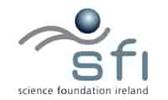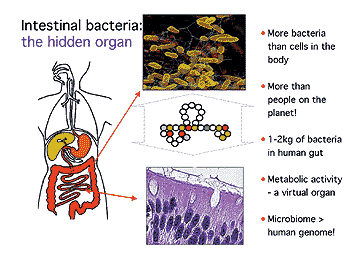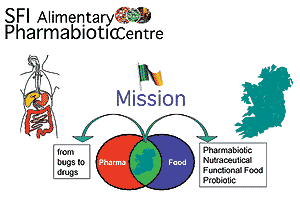| 2003 |

|
YEAR BOOK |
University College Cork, Cork University Hospital & Teagasc
|
SFI Alimentary Pharmabiotic Centre
|

|

|
The Alimentary Pharmabiotic Centre (APC) is one of three recently created Centres for Science, Engineering and Technology funded by Science Foundation Ireland (SFI). Professor Fergus Shanahan, of the Department of Medicine at University College Cork and Cork University Hospital, will lead a team of up to 50 scientists and postgraduate students in a world-class research centre working on themes concerned with the contribution of the gut flora to health and disease. The Centre will be headquartered at UCC's Biosciences Institute in partnership with researchers at the Teagasc Biotechnology Centre in Moorepark, Fermoy, Co. Cork. Initial funding for the Centre is in excess of �20m, with �16.5 from SFI and the remainder provided by industrial partners.
The APC will provide added momentum and critical mass to a previously well established and internationally recognised research team. The multidisciplinary team includes clinicians and scientists encompassing gastroenterology, microbiology, immunology, bioinformatics, molecular biology, and food science. The APC will facilitate the development of exciting new strategies in partnership with the food and pharmaceutical industries for patients across a large range of clinical disorders. It will serve as a pivotal resource for both the food and pharma sectors, providing training and high level expertise suited to both sectors. The APC will also form a critical alliance with the National Food Biotechnology Centre also housed at UCC, under the direction of Professor Gerald Fitzgerald, who will serve as Deputy Director of the new Centre. In addition, the APC will adopt educational and outreach programmes intended to stimulate and promote renewed interest in the sciences amongst younger students.

Intestinal bacteria: the hidden organ
There are ten times more bacteria in the human gut than there are mammalian cells in the entire body. The majority of these bacteria are vital for our health - in humans they make vitamins, stimulate the immune system, and break down toxins. However, intestinal bacteria have been linked to a number of common diseases - e.g. Helicobacter pylori and peptic ulcers; infectious diarrhoea and Salmonella, Listeria and Campylobacter. Crohn's disease, colorectal cancer, Inflammatory Bowel Disease (IBD), and Irritable Bowel Syndrome (IBS) are all affected by the bacteria in the gut.
Crohn's disease is a lifelong, relapsing and remitting disorder, characterised by inflammation that may affect any part of the gastrointestinal tract. Three interacting factors are known to play a part in Crohn's disease: host genetic susceptibility, environmental triggers, and immune-mediated tissue injury. Current drug therapy for Crohn's disease involves suppression of the inflammatory response. Use of antibiotics to modify gut flora is unproven in Crohn's disease. An alternative strategy is the use of probiotics. These are defined as live microorganisms that, when consumed in adequate amounts, confer a health benefit to the host. The scope of probiotic strategies is now well recognised in agricultural, veterinarian, medical and commercial arenas.
IBS affects 10-20% of the population and is characterised by a group of symptoms in which abdominal pain or discomfort is associated with a change in bowel pattern. Current therapies are frequently ineffective.

Scientific Themes of the Centre
The team at UCC has isolated and characterised several strains of intestinal bacteria that are effective probiotics under different circumstances in animals and humans. The APC will explore in detail the precise mechanism by which these probiotic/ commensal bacteria confer protection against disease. The APC will deploy this bank of well characterised strains of probiotic organisms isolated from the human gut as experimental tools to develop an understanding of the mechanisms of action of commensal/probiotics in health and disease and to identify new molecular targets that can be exploited therapeutically. It is anticipated that the research will not only facilitate optimal exploitation of probiotic therapy but will also enable substitution of probiotic effector cells with drug analogues of the molecules responsible for mediating probiotic effects in vivo. The APC aims to develop novel therapies for IBS and other gastro-intestinal disorders by increasing the understanding of the pathophysiology of IBS and gaining further insight into the impact of gut flora on core neuroendocrine stress systems.
APC Research Programmes
|
� Bacteriocins as tools for influencing gut microflora; Leaders - Dr Paul Ross & Professor Colin Hill
� Host response to commensal (and probiotic) flora; Leaders - Professors Fergus Shanahan & J. Kevin Collins � Pathogenicity (and probiotic interactions); Leaders - Professor Colin Hill & Dr Cormac Gahan � Bacterial genomics and bioinformatics; Leaders - Dr Douwe van Sinderen, Dr Des Higgins & Professor Lothar Steidler � Bacterial metabolism - metagenomic and specific metabolite approaches; Leaders - Drs Julian Marchesi & Catherine Stanton � Physiology - Neuroendocrine responses to commensal and probiotic flora; studies in animal models and patients with Irritable Bowel Syndrome; Leaders - Professors Ted Dinan & Eamonn Quigley. |
Outreach Plans
A programme of outreach activities to stimulate understanding and interest in science among the general public and relevant professional sectors will be a core activity of the APC. A particular goal will be to introduce second level students to the process of discovery which is central to scientific research, and the role of healthy informed debate in deciding on scientific dogma. Science teachers, those responsible for formulating and influencing science policy, and clinical practitioners, will also be targeted. The outreach programme will include open days, lecture series, student placement programmes, participation in Science Week, and interaction with clinicians and patient support groups. There will be a specific schools liaison programme complementing the existing university programme.
Contact: Professor Fergus Shanahan, Director, Alimentary Pharmabiotic Centre, Biosciences Institute, University College Cork; E-mail: [email protected]